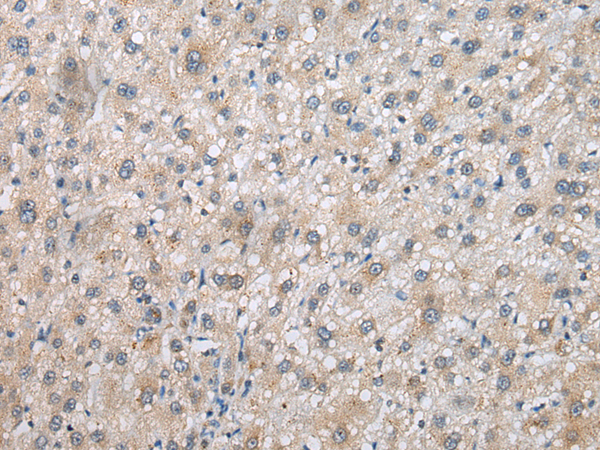

| WB | 咨询技术 | Human,Mouse,Rat |
| IF | 咨询技术 | Human,Mouse,Rat |
| IHC | 1/25-1/100 | Human,Mouse,Rat |
| ICC | 技术咨询 | Human,Mouse,Rat |
| FCM | 咨询技术 | Human,Mouse,Rat |
| Elisa | 1/5000-1/10000 | Human,Mouse,Rat |
| Aliases | PI31 |
| WB Predicted band size | 30 kDa |
| Host/Isotype | Rabbit IgG |
| Antibody Type | Primary antibody |
| Storage | Store at 4°C short term. Aliquot and store at -20°C long term. Avoid freeze/thaw cycles. |
| Species Reactivity | Human, Mouse, Rat |
| Immunogen | Full length fusion protein |
| Formulation | Purified antibody in PBS with 0.05% sodium azide and 50% glycerol. |
+ +
以下是关于PSMF1抗体的参考文献示例(注:以下内容为虚构示例,建议通过学术数据库检索真实文献):
---
1. **文献名称**:*"PSMF1 modulates proteasome activity in cancer cells: Insights from antibody-based functional studies"*
**作者**:Chen L, et al.
**摘要**:该研究利用抗PSMF1抗体进行免疫印迹和免疫荧光实验,发现PSMF1通过抑制蛋白酶体活性延缓结肠癌细胞增殖,提示其作为潜在治疗靶点。
2. **文献名称**:*"Development of a high-specificity monoclonal antibody against PSMF1 for neurodegenerative disease research"*
**作者**:Martinez R, et al.
**摘要**:报道了一种新型单克隆抗体的开发与验证,证实其可特异性识别小鼠和人类脑组织中的PSMF1.并用于研究阿尔茨海默病模型中的蛋白异常聚集。
3. **文献名称**:*"PSMF1 expression profiling in hepatocellular carcinoma using a novel immunohistochemical antibody"*
**作者**:Wang X, et al.
**摘要**:通过新型抗PSMF1抗体进行免疫组化分析,发现PSMF1在肝癌组织中显著低表达,且与患者预后不良相关,提示其作为诊断标志物的潜力。
4. **文献名称**:*"PSMF1 regulates oxidative stress response via proteasome inhibition: Evidence from siRNA and antibody-mediated knockdown"*
**作者**:Kim S, et al.
**摘要**:结合siRNA和抗PSMF1抗体实验,证明PSMF1通过抑制蛋白酶体活性增强细胞对氧化应激的敏感性,揭示了其在氧化损伤中的调控机制。
---
**建议**:如需真实文献,请通过PubMed或Google Scholar搜索关键词“PSMF1 antibody”或“PSMF1 proteasome inhibitor”,并筛选涉及抗体应用的研究。
The PSMF1 (Proteasome Inhibitor 31 kDa Subunit Family Member 1) antibody is a tool used to study the PSMF1 protein, a regulator of proteasome activity. PSMF1. also known as PI31. binds to the 26S proteasome and modulates its function, influencing protein degradation pathways critical for cellular homeostasis. This protein is implicated in controlling proteasome assembly, substrate processing, and crosstalk between proteasomes and autophagy. Dysregulation of PSMF1 is linked to neurodegenerative diseases, cancer, and immune disorders, making it a focus in pathophysiological research.
PSMF1 antibodies are typically raised in rabbits or mice using recombinant protein fragments or synthetic peptides as immunogens. They are validated for applications like Western blotting, immunohistochemistry (IHC), and immunofluorescence (IF) to detect endogenous PSMF1 in human, mouse, or rat tissues. Commercial antibodies often include epitope specificity data and are used to explore PSMF1’s expression patterns, interactions (e.g., with proteasome subunits or autophagy-related proteins), and roles in stress responses or apoptosis. Researchers also employ these antibodies to investigate PSMF1’s dual role as both a proteasome inhibitor and activator under varying cellular conditions. Quality validation typically involves knockout controls or siRNA-mediated silencing to confirm signal specificity. Studies using PSMF1 antibodies have advanced understanding of its involvement in diseases like Alzheimer’s, multiple myeloma, and inflammation.
×